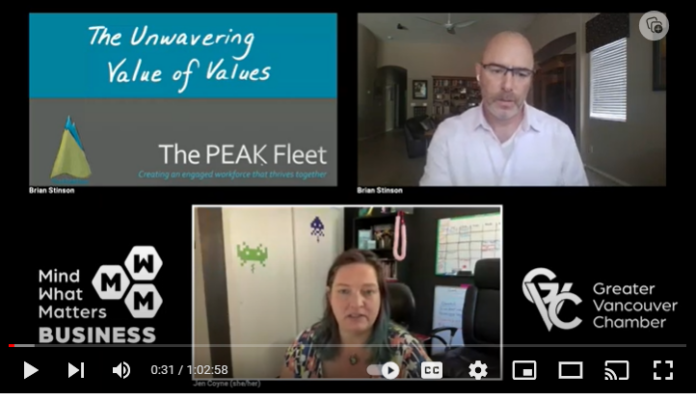According to Jen Coyne, CEO and majority owner of The PEAK Fleet, research shows that only 10% of companies or organizations have operationalized their stated values. Coyne shared this fact with a virtual audience during the Greater Vancouver Chamber’s July 27 Mind What Matters Webinar: The Unwavering Value of Values.
Coyne and Brian Stinson, co-founder and owner of The PEAK Fleet, gave about an hour-long presentation to those in attendance regarding how companies can be successful in operationalizing the core values of their company or organization. The presentation discussed “how an established values-based culture can serve as your compass during periods of diversity and uncertainty, guiding you and your team towards consistent alignment with your organization’s mission.”
First launched in November of 2016, The PEAK Fleet aims to “help organizations succeed by creating an engaged workforce that thrives together,” according to the organization’s mission on their website. The company helps organizations with purpose and values, strategy and problem-solving, organizational transformation, leadership development, and inclusion and belonging.
Stinson started off the July 27 webinar by discussing the importance of personal core values and that it is important for organizations to have people within their company define their own personal core values before moving forward with the core values of the company. He used the analogy of a company’s culture being like a magnet and looking at what kind of people (employees and customers) that the company culture attracts.
Looking at an organization’s core values, Coyne discussed how to see those values in action in a few different ways, including:
- Do they reflect how the organization operates most of the time?
- Can your company identify the core values?
- Are they reinforced in your performance evaluations?
- Are they on your website and other outward-facing materials?
- How are they reinforced day-to-day?
Coyne said that research in these areas shows that only about 22% of companies report that over half of their employees can recite their company’s values. This can be changed by operationalizing those values and bringing them forward and making them even more present in the things that your company does, such as being reinforced in performance evaluations. Also, discussing your values while having interactions with team members and including them in day-to-day discussions and operations.
“There’s a huge opportunity by operationalizing them (your values) to increase engagement not only with your employees but also with your customers and it helps to lead to all of those positive outcomes,” Coyne said. “When you look at operationalizing those values, you want to look across your entire organization. It’s not very effective if, say, the frontline employees are held to one standard but maybe ownership or others are held to another standard. You want to look top down at all of the roles in the organization and all of the functions.”
Some things that Coyne said organizations will want to consider when going down this path of operationalizing values include level of time and money to invest in the process; who you want to include in development; the process you want to use; and what barriers there might be to attachment. Stinson also pointed out that the magnitude of taking this on will depend on the size of the organization.
“If you’re a smaller organization, you can all sit around a table and talk about this,” Stinson said. “It’ll be a little easier than if you’re talking about 50-100, or 1,000 people.”
The ability to include your organization’s core values in day-to-day meetings and overall culture is also very important, according to Coyne. A few things to remember while doing this include:
- Defining behavioral expectations is very important. Even if it’s just you in your company, you should still do this for yourself and ask, how will you behave when you interact with clients or partners, etc.
- Review and reinforce in meetings to gain attachment. Having your values up everywhere where your employees can see them and bringing them up consistently in weekly or monthly meetings will help gain attachment.
- Values exercises are extremely valuable in gaining trust. This helps to build greater understanding amongst each other and in turn also helps with healthy conflict resolution.
“We talked about in the beginning purpose, value, vision being our intentions,” Stinson said. “What most organizations, most leaders try to focus on is commitment and accountability and results. Well, the formula is if you have the scaffolding of the purpose, vision, values; in you invest in trust and practice healthy conflict, then the commitment, accountability and results will follow.”
A few other areas that Coyne addressed that are top priority for operationalizing your company’s values included hiring, supply chain, and sales and marketing.
“You’ll be hiring for what kind of diversity will help strengthen your organization,” she said. “We advocate that you increase diversity with each hire because there is strength in bringing diverse perspectives into an organization. Values should align and the person should be able to uphold the values of your organization. And for them to stay, it’s important that their values are served by your organization.”
“The supply chain is another place to go in and dig into your processes and think about how you would embed those values into your supplier selection process,” Coyne said. “What are the behaviors and policies that are most important to us as a part of those core values and what are we going to do if they don’t align with those suppliers that we’re choosing?”
To learn more about The PEAK Fleet or to get in touch with Coyne or Stinson, visit their website at www.thepeakfleet.com.




